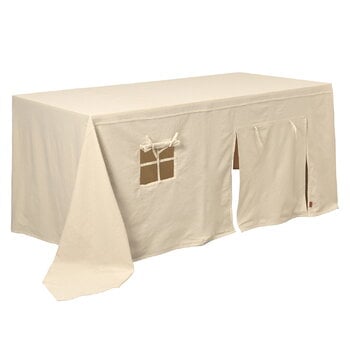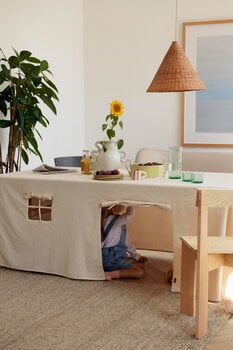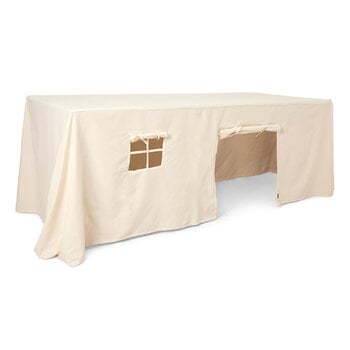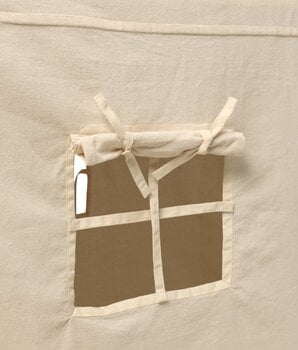With Ferm LIVING's Settle tablecloth house, you can turn the table into a charming hut, where the wee ones – and maybe us adults as well – can let their imagination go wild and play house or set up a shop; whatever comes to mind! The tablecloth house is made of recycled cotton and features three small windows and a door that can either be closed or rolled up and fixed with convenient strings. Invite a bit of adventure into everyday life with the Settle tablecloth house!
Settle table cloth house, 260 x 230 cm, off-white
ferm LIVING
Description
With Ferm LIVING's Settle tablecloth house, you can turn the table into a charming hut, where the wee ones – and maybe us adults as well – can let their imagination go wild and play house or set up a shop; whatever comes to mind! The tablecloth house is made of recycled cotton and features three small windows and a door that can either be closed or rolled up and fixed with convenient strings. Invite a bit of adventure into everyday life with the Settle tablecloth house!
Product details (7)
- Material
- 100% Recycled post-industrial cotton
- Colour
- Off-white
- Length
- 260 cm
- Width
- 230 cm
- Measurement details
- Drop length (seam - hem) 70 cm
- Care instructions
- 30°C gentle wash
- Notes
- Do not leave children unattended when the product is in use and there is something on top of the table.
- Product ID
Reviews (1)
5
Based on 1 reviews
-
Z
Zlata S
Natural fabric, great playground. Kids are loving it, the small and big ones.
233 days ago
Sustainability
The Product Sustainability Framework, our criteria of sustainable design, helps you find the most sustainable products in our selection. Read below which sustainability criteria this product has met.
Working conditions & labour 8/9
-
Equal opportunities for all employees
-
Commitment to UN Global Compact, fair compensation for all employees
-
Corporate responsibility requirements defined and communicated for suppliers
-
Systematic work for improved inclusion and well-being in the workplace
-
Transparent supply chain
-
Suppliers' compliance to a code of conduct ensured
-
Direct suppliers audited and certified
-
Compliance to the UN Guiding Principles on Business and Human Rights ensured in the supply chain
-
Support for community involvement in the supply chain
Eco-friendly production 8/9
-
Fair and resource-wise water-use in production
-
No incineration or landfilling of returned items
-
No use of endangered species as materials
-
No direct environmental emissions or waste (excl. GHGs) from production
-
The sustainability of direct suppliers' production is addressed and monitored
-
Production and material sourcing that respect biodiversity, animal rights, and natural ecosystems
-
Material-efficient and ecological packaging
-
No potentially harmful chemicals used in own production
-
Positive impact on nature’s well-being through operations that regenerate natural ecosystems
Climate impact 5/8
-
Company's direct greenhouse gas emissions identified and commitment to reduction
-
Product's carbon impact identified and commitment to reduction
-
Guidance on energy- and eco-efficient use of the product
-
Contribution to climate initiatives beyond the brand’s direct operations
-
Carbon footprint of the product calculated and goals set to reduce it
-
Low-carbon or compensated transportation
-
100 % renewable energy in own production and operations
-
Carbon neutral or carbon negative product
Sustainable materials 6/6
-
Sustainable and long-lasting material choices
-
No harmful or hazardous substances
-
Responsible raw material sourcing and production
-
Materials suited for circularity: monomaterials, recyclable finishings, renewable or recycled contents etc.
-
Ecological materials: natural, biodegradable, recyclable or recycled contents
-
Outstanding materials in terms of innovativeness, responsibility, sustainability and circularity: local production or sourcing, 100 % recycled content, C2C-certification etc.
Circular design 4/5
-
High aesthetic quality promoting long-term use of the product
-
Technically durable product design and material choices
-
Design for enduring life-long quality
-
Design and support for product maintenance, repair and upgradability
-
Innovative circular design solutions: circular service system, resale platform, remanufacturing, collection of used products, etc.










